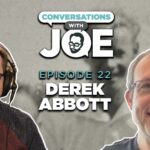This Man Just Woke From The Dead. Sort-of.
May 09, 2022
Clive Wearing lives life 7 seconds at a time. That’s because he has both retrograde and anterograde amnesia, which means he has no ability to form new memories and remembers nothing of his life before. It’s hard to imagine what it’s like to live like this, but his condition teaches us a lot about how we form memories and how the structure of the brain structures our lives.
In a neurological institution in the UK, lives a man named Clive Wearing. Clive is 83 years old, and actually he’ll be turning 84 two days after this video comes out. Thing is, he doesn’t know this. In fact he probably thinks he’s still in his 40s.
And chances are, less than a minute after he blows out his candles, he will have forgotten it completely. He’ll have no idea it’s his birthday, or even how old he is.
This might sound like the kind of dementia that one might expect from a person of that age, which is sad but inevitable, but Clive Wearing has been like this for over 40 years, and his memory issues go far beyond normal and expected.
In fact, there’s nobody else in the world that’s quite like him.
That’s because Clive has two different forms of amnesia. Chronic anterograde and chronic retrograde amnesia.
- Anterograde amnesia (meaning he can’t create new memories)
- Retrograde amnesia (meaning he’s lost many of his memories)
When combined this means Clive is unable form any new memories, and can barely remember anything about his life before he developed amnesia.
So Clive just kinda… exists. He lives his life on an endless loop, 30 seconds at a time, never knowing exactly what just happened or where he’s going.
It’s kind-of impossible to even imagine what this must be like. Our continuity of consciousness is pretty much what defines our experience of life. Clive describes it as feeling like he’s constantly waking up.
In fact, he keeps a journal that is just filled from top to bottom with him proclaiming “I am now awake,” or “I live” with a lot of the earlier entries crossed out because when he sees them, he doesn’t believe that he wrote them, even though they are in his handwriting.
Also, and this kinda heartbreaking, but Clive is married. And every time he sees his wife, he rushes to hug her like he hasn’t seen her in years.
Deborah Wearing actually wrote a book about their experience called Forever Today: A True Story of Lost Memory and Never-Ending Love,
where she described his experience like this:
Yeah, this is where it gets kinda creepy. He often describes it as having been dead.
He lives in a beam of light with darkness ahead and behind him.
It’s creepy to think about, but Clive’s situation opens up a lot of questions about how memory works in the brain and what it means for our conscious experience.
For example, he’ll claim he doesn’t even know what coffee tastes like, even though he drinks coffee every day. If you ask him where the coffee is, he can’t tell you, but once he’s in the kitchen, he’s perfectly able to make a cup for himself.
Meaning he knows where the coffee is, the cups, the spoons, the sugar, the cream, all that, and he knows how to prepare it… but when he’s sitting in front of the TV, he’ll tell you he has no idea where all that stuff is and doesn’t even know what coffee tastes like.
Today Clive lives under constant care and observation because literally if he were to leave the house, he would have no way of getting back home.
Normal activities like reading a book or watching a movie are out of the question because he would constantly be forgetting the previous scene or the page he just read.
Actually the only entertainment he seems capable of enjoying are sports like cricket or rugby because the action takes place in short segments that are short enough that he can process them.
And this can be very frustrating for Clive because obviously, he wasn’t always like this.
Before the amnesia, he was a kind-of a world-renowned musician, he was a highly respected guy, so in general in conversations he sticks to just a few subjects that he can talk intelligently on.
And he does talk. In fact, chattering on endlessly is kind-of a way for him to remain grounded.
He will sometimes speak about WWll and hiding in air raid shelters as a young boy or talking about the choir at Cambridge.
He also can draw on a slurry of topics that interest him or of which he knows something about. Which makes it so that, if you’re just meeting him, he seems pretty normal.
But in about 15 minutes when you notice he’s said the same thing 3 times in a row… He doesn’t seem so normal.
He also jokes a lot. Kind-of compulsively. It’s actually a condition called Witzelsucht , (vitzul-shoot) which when you have a German condition you know it’s bad news.
Looking at you Munchausen Syndrome.
But no, actually Witzelsucht is known as joking disease, and it’s likely a consequence of his frontal-lobe weakening as he ages.
Clive’s condition is very remarkable and unique to only him. And that begs the question. Just how did this happen?
HERPES! Literally just your basic, run-of-the-mill herpes simplex 1 (HSV-1).
Which is funny… but also horrifying.
Horrifying because a LOT of people have herpes. It’s one of the oldest viruses on the planet, in fact there is a herpes virus for every type of primate there is.
And for most people the worst symptom is cold sores on their lips. If you’re unlucky, you might get sores on your genitals.
But for Clive, somehow the virus crossed the blood brain barrier and attacked his hippocampus. Even unluckier, the doctors couldn’t figure out what the illness was and treated him for the flu.
It was only after he was completely unresponsive that they were able to figure out the actual problem. By that time the damage had been done.
he hippocampus, as you’ve probably already guessed, plays an important part in the memory equation, it kinda transfers memories from short-term to long-term storage.
But of course it’s more complicated than that because as I mentioned earlier, he knows how to make coffee, and where all the coffee stuff is kept, even if he can’t explain it verbally.
So long-term memory is broken up into explicit and implicit memory. You can describe explicit memory as declarative, things that can be consciously described. Implicit memory are non-declarative, things that are more felt and intuitive.
And these can be broken down further, for example there are two types of explicit memories,
- Episodic (experienced events) Ex: Recalling unique memories of your life
- Semantic (knowledge and concepts) Ex: Knowing state capitals and dates of things.
On the other side, Implicit memories can be:
- Procedural (skills and actions) Remembering how to do things like play music or shuffle cards well
- Emotional conditioning (feelings) Memories which evoke emotion.
And all of this gets confusing with Clive’s condition because some of this he has and some of this he doesn’t.
Like the coffee thing from earlier, that’s Implicit Prodedural memory. He understands that at a subconscious, instinctual level, but if he were to try to recall a specific memory of him doing that in the past… which would be Explicit Episodic memory, he can’t.
You get what I’m saying here?
And sometimes it’s hard to pin down the truth, like he claims to have a vague memory of hiding in bomb shelters during World War 2, which would be Explicit Episodic, but it might just be that he knows the fact that people sheltered from bombs in World War 2, that would be more Explicit Semantic.
But to me the most interesting thing he was able to retain was his ability to play music.
So I mentioned he was a respected musician earlier, well that’s kind-of an understatement.
He was considered like the world’s foremost expert on this late renaissance composer named Orlande de Lassus.
And yes, you’re right, that is a very specific thing to be an expert in, now meet me at camera…
Two… because that’s what makes a person really interesting.
Hey you want to be an interesting person? Or at least convince other people that you’re interesting? It’s really simple. Just become the world’s foremost expert on the most specific, weird, obscure thing you can think of.
Nothing is more interesting to me than to meet someone who has spend a significant amount of their lifetimes obsessing over the tiniest detail of something that I’ve never heard of.
Where you’re just like, “Wow, really?”
Like it makes me wonder what it is about this thing that they’re so passionate about, there must be something there I can’t see.
That is the definition of interest.
Now find your weird thing and nerd the hell out on it.
Sorry, what were we…?
Orlande de Lassus, right, Clive was the world’s expert on his music, he had an encyclopedic knowledge of his work.
He actually ran The London Lassus Ensemble, and led the 1982 London Lassus Festival, which celebrated his 450th birthday.
Right, Clive was a supernerd.
Today, Clive has absolutely no memory of any of it.
But the question is, can he still play music? I did a video a while back about how music hacks the brain, it does hold a strange and deep connection in our minds.
Could his musical ability survive all that memory loss?
Yes, he can still rip up a piano just like he used to.
He can both read music and perform music from memory. And you might think that it would be shocking to sit down at a piano, thinking you don’t know how to play, and then suddenly this virtuoso music comes pouring out of you. But for Clive, he just kinda slips into it. As soon as he starts pressing keys, he’s himself again, lost in the movement, and everything is what it should be.
That sounds nice. But for Clive the real shock is after when his brain resets.
In fact he would kinda convulse and burp and lose control over himself. It’s like his body reacting to being sucked back into the void where he thinks he’s just woken up for the first time ever.
Doctors ascribe his seizure-like shakes to damage in his inferior frontal lobe.
It’s like when his brain sends a signal to activate an emotion, it creates a near epileptic event.
What’s also interesting about his playing music is that he improvises. So it’s not like his brain is acting like an old victrola playing the same thing over and over, Clive’s still in there.
So yeah, once again, music is weirdly intertwined with our identity and sense of self.
It’s really hard to imagine exactly what it’s like to live like Clive.
Part of it sounds hellish. But then again, that hell is forgotten 10 seconds later.
It’s also hard to imagine being in a relationship with someone like that. After years of caring for him full time, Deborah had to finally distance herself from Clive, just visiting him every other week or so.
And she would say that she felt a lot of guilt about that for a while, but… he didn’t. He wasn’t missing her when she was gone, when she wasn’t there, he had no idea she existed.
I should point out that he had no memory of their relationship, but when he saw her, he knew she was his wife. Again, he retained that implicit knowledge but had no episodic memory of it. It’s super interesting.
H.M.
And while I say that Clive has a condition that is totally unique to him, there are other cases of amnesia that are all just as interesting.
Henry Molaison, who came to be known as HM, cracked his skull in an accident when he was a young boy in 1953.
This led to epileptic seizures that continued to get worse and worse throughout his life, eventually becoming debilitating.
Eventually this led him to one of the top neurosurgeons at the time, a guy named W.B. Scoville, and his suggestion was to remove the hippocampus.
The hippocampus and while they’re at it the parahippocampal cortices, entorhinal cortices, piriform cortices, and amygdalae.
It was the world’s first surgery performed with an ice cream scooper.
But it worked. H.M.’s seizures went away, but of course as we just learned with Clive, a hippocampus is a terrible thing to waste.
This is your brain. This is your brain without a hippocampus. Any questions?
So yeah from that point forward H.M. was unable to form new memories. And he struggled to remember anything in the couple of years before he had the surgery.
He was diagnosed as having temporally graded amnesia.
One more weird thing, when H.M. died in 2008, he donated his body to science and researchers sliced up his brain as thinly as possible and scanned it into a 3D virtual environment, which you can see today at thebrainobservatory.org.
Cochrane
Another story is Kent Cochrane, who suffered a severe motorcycle accident that caused brain damage and gave him temporally graded retrograde amnesia.
Cochrane had his semantic memory intact; he could tell you the Capital of Vermont was Montpilliar but couldn’t tell you what he had for dinner the previous day.
Cochrane’s accident happened in 1986 and at that point CT scans were available, so scientists for the first time got to document a damaged brain at that level.
Researchers working with him were able to learn some new things about episodic and semantic memory but also the distinction between implicit and explicit memory, and how people learn new things in amnesia.
In one experiment, neuro researchers presented Cochrane with a list of words. A year later, they showed him the words with letters missing and he was able to fill in the letters while not knowing what the words really were.
In other words the info was getting into his mind through a different process, and found a different retrieval process was different as well.
This challenged the previous opinion that patients with anterograde amnesia are incapable of adding information to their declarative memory. In short, people with amnesia can indeed learn new things.
Bolzan
Then there’s the case of Scott Bolzan which I don’t want to spend too much time on but his case is interesting.
He was a professional football player in the 80s and had his share of concussions because this was way before the helmet to helmet rule.
But his story is he slipped on the bathroom floor and hit his head. And he got the kind of amnesia you always see in the movies, where he forgot his entire life up until the fall, but could make new memories after that.
But what’s weird in his case is he lost the procedural memory and implicit stuff, like he didn’t know what a job was, or the ritual of Halloween, or what a wife is.
Normally amnesia patients retain that procedural memory. So there are some people who think that he’s faking it?
At least Dr. William Barr thinks so, describing his symptoms as “Hollywood amnesia” and suggests he’s doing it to sell a book or get out of some debts.
He would also say, “Not knowing what a TV is, not knowing what a cellphone is, this is all inconsistent with any known form of brain damage.”
But back to Clive, reading about his situation really makes you think about our experience of life, and how the structure of our brain contributes to that.
Because one one level, we’re all going through life exactly like Clive is. Just one moment at a time.
We all have these two memory systems, short term and long-term. And short-term, immediate, real-time system is always running, that’s our present moment, what’s right in front of us. It’s the current block you’re on as you’re walking across town.
But that present moment is informed by our memory of the block we just passed and we know what’s up ahead because we walked there yesterday, those long-term memories provide the context that create this feeling of a continuation of our consciousness.
And when our short-term system resets, it’s supported by this other memory system, so it doesn’t feel like a reset but that system does still reset.
We’re just ridin’ a skateboard on a beam of light through fabric of space and time bud…
If I may end on a sweet note, one thing about this story that gets me is the way he responds when he sees his wife. Every single time, even if she just left the room for 10 minutes, he runs to her and holds on to her like he hasn’t seen her in years, he’s just overcome with emotion.
Which is sweet… but… I mean I get why she had to get away from it after a while.
Like I said before, he doesn’t remember his relationship with her, all he knows is that he loves her with all his heart. Which kinda says something about how deep down the emotion of love is.
I actually think Clive said it best when Deborah asked him, “What does love mean?” And to that Clive responded, “In tennis nothing, in life everything.”
And to that I say, Good show, old chap. (a beat) And happy birthday.






Leave a Reply